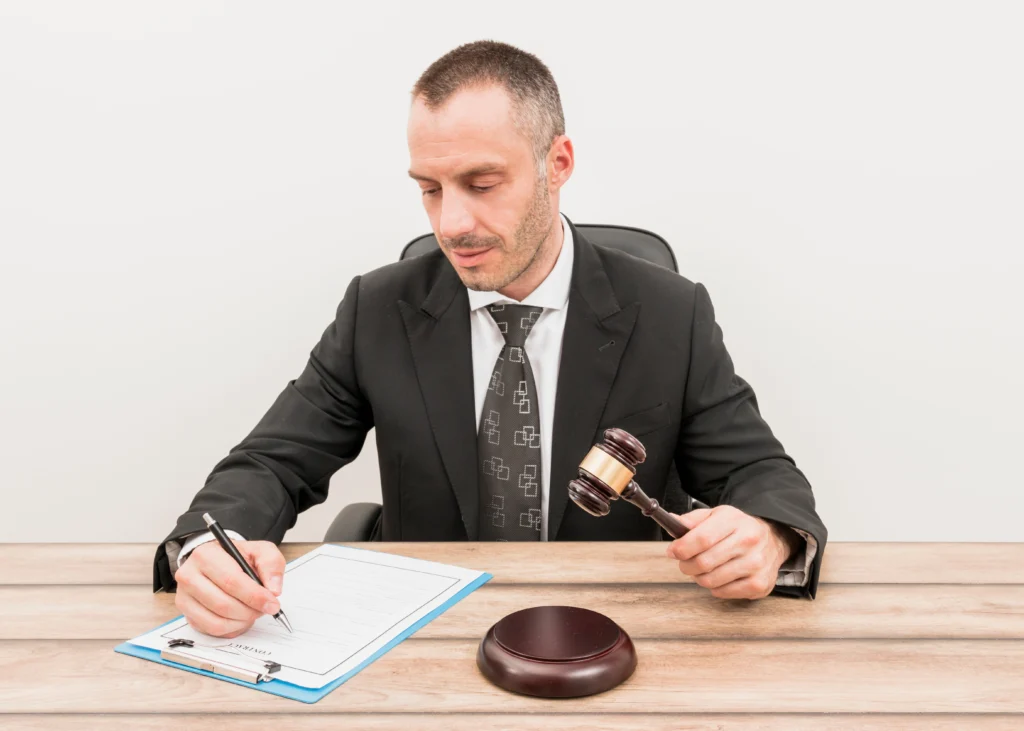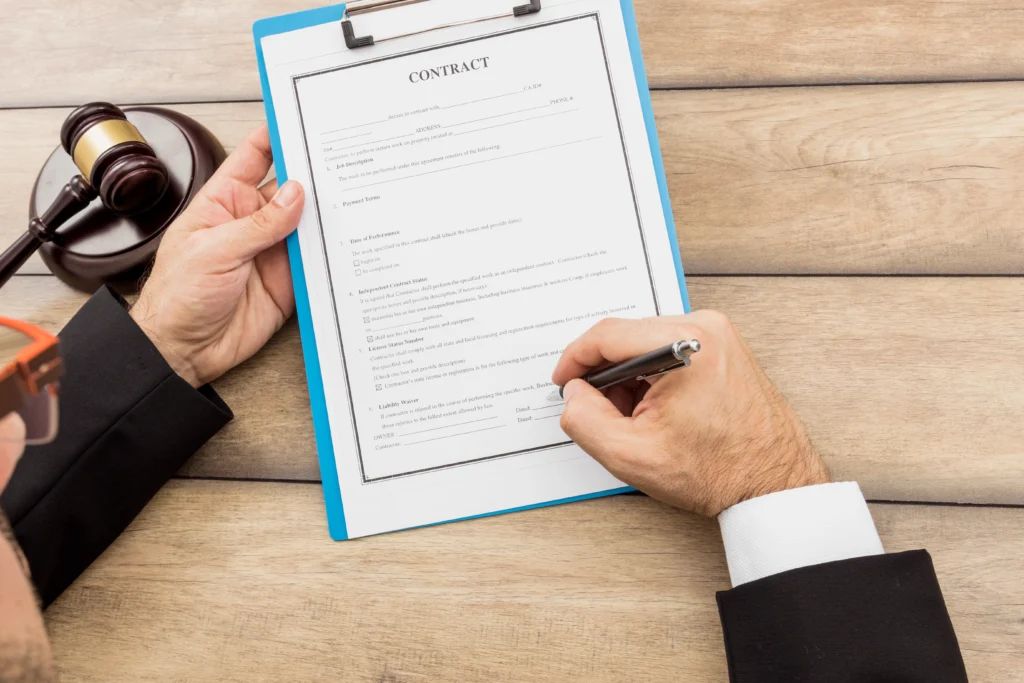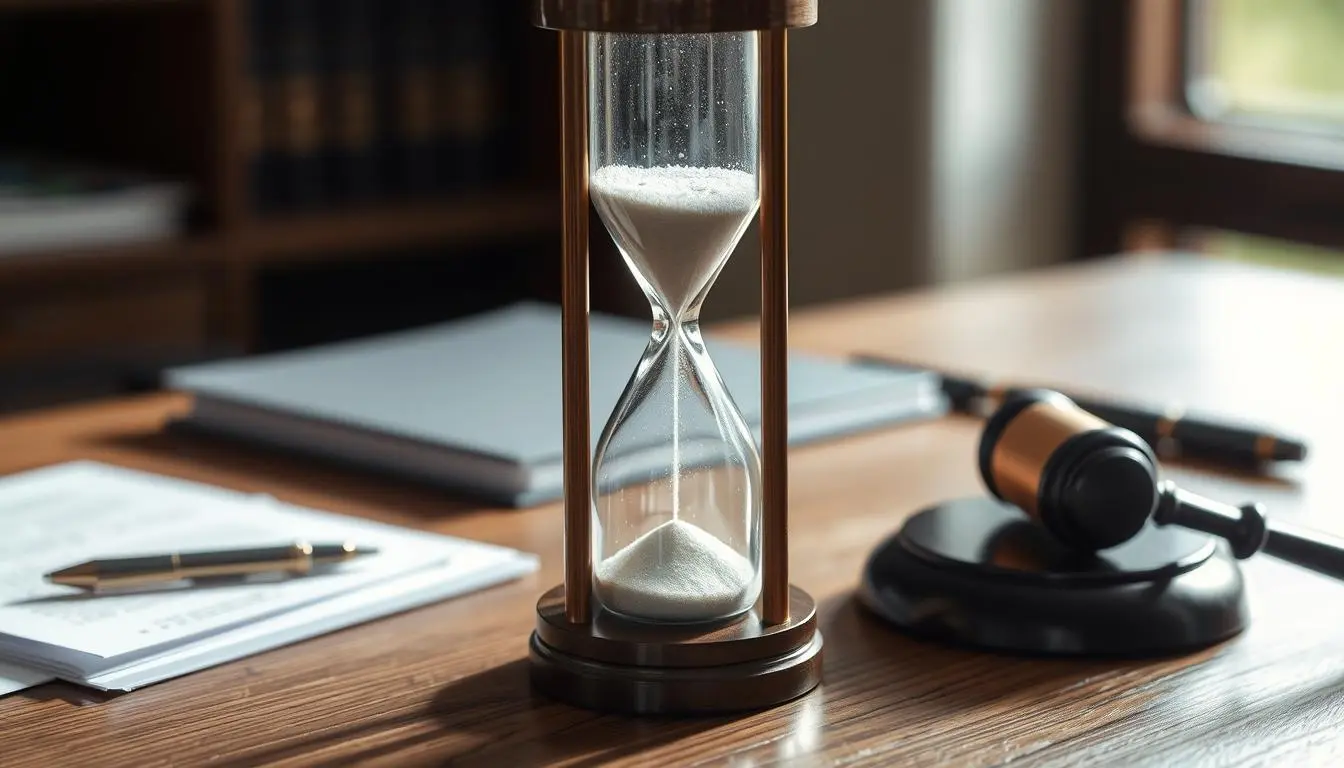If someone's carelessness or intentional actions hurt you, you might need to sue for damages. What does litigation mean in a personal injury case? Litigation is the legal process of filing a lawsuit and seeking compensation in court.
Many personal injury cases settle without going to court, as parties often agree on damages. However, if talks fail, the case moves to litigation. This involves filing a complaint against the defendant, outlining the injuries and damages you're seeking.
The court process is complex and time-consuming. It includes filing a complaint, the defendant's response, discovery, motions, pretrial negotiations, trial, and potential appeals. While many cases are resolved before reaching court, understanding what litigation means in a personal injury case can help you prepare for seeking justice and fair compensation when necessary.
For detailed information about various personal injury cases, click here.

Key Takeaways
- Litigation is the legal process for filing a personal injury lawsuit and seeking compensation through civil court proceedings.
- Many personal injury cases are resolved through negotiations, but litigation may be necessary when settlement talks fail.
- The litigation process involves steps such as filing a complaint, discovery, motions, pretrial conferences, trial, and potential appeals.
- Most injury cases settle before going to trial, but litigation is often necessary to seek justice and fair compensation.
- Consulting with an experienced personal injury attorney can help guide you through the complexities of the litigation process.
Understanding Litigation in Personal Injury Cases
If someone's carelessness has hurt you, it's key to know what does litigation mean in a personal injury case. Litigation involves taking legal action against the person responsible for your injury, seeking compensation for your harm and losses. This process begins with filing a complaint in court and serving the necessary papers to the defendant.
Not every injury case goes to court. Often, you can settle with the at-fault party's insurance. However, if the insurance denies your claim or offers inadequate compensation, your lawyer might recommend litigation. Understanding what does litigation mean in a personal injury case helps you prepare to fight for the damages you truly deserve.
Definition of Litigation
Litigation is when you take a legal case to court. In injury cases, it's when you sue the person who hurt you. You're seeking money for your injuries, medical bills, lost work, and more. The goal is to get a judge or jury to decide and give you fair compensation.
Differences Between Insurance Claims and Lawsuits
Insurance claims and lawsuits both aim to get you money for your injury. But they differ in a few ways:
- Claims go straight to the insurance company, while lawsuits are filed in court against the person who hurt you.
- Claims usually involve talking to an insurance adjuster, while lawsuits mean presenting your case to a judge or jury.
- Claims are quicker to settle than lawsuits, which can take months or years.
Studies show people with lawyers get about three times more money than those without. Most cases settle before going to court, saving time and money. Having a skilled personal injury lawyer greatly increases your chances of winning and getting the right amount of money.
The Personal Injury Litigation Process
When talks with the insurance company fail, a victim might need to file a personal injury lawsuit. This starts the legal fight for fair pay. The process has several important steps.
Filing a Complaint
The first step is filing a complaint. This document lists the plaintiff's claims, injuries, and what they want in compensation. It must be filed before a certain time limit, known as the statute of limitations, which varies by state. In Fort Lauderdale, for example, victims have one year to start their lawsuit.
Serving the Defendant
After the complaint is filed, the defendant must be told about the lawsuit. This is called "serving." The defendant then has a certain time to reply with an answer to the complaint.
The Discovery Phase
In the discovery phase, both sides collect evidence and take depositions. This includes medical records, accident reports, witness statements, and expert opinions. This phase is key for building a strong case and finding any disagreements over who's at fault or how much compensation is needed.
Pretrial Motions and Conferences
Before the trial, the court may hold conferences to deal with any issues or motions. This is a chance for the judge to push for settlement talks and make sure the case is ready for trial.
Trial Proceedings
If the case goes to trial, both sides present their evidence and arguments to a judge or jury. The plaintiff must show that the defendant's negligence caused their injuries and justify the damages they're asking for. The trial can last from a few days to several weeks, depending on the case's complexity.
Appeals Process
If someone is unhappy with the trial's outcome, they can appeal to a higher court. The appeals process is long and expensive, but it might be needed to get a fair outcome.
Most personal injury cases settle without going to trial. But, if parties can't agree on fair compensation or if insurance companies don't offer enough, litigation is needed. Knowing the litigation process and having experienced legal help can help victims get the compensation they deserve.

Reasons for Pursuing Litigation in Personal Injury Cases
In some cases, going to court is the only way to get fair compensation. This happens when insurance companies deny claims or offer too little money. Negotiating settlements through civil court proceedings is the only option to get what's owed.
Another reason for court is when there's a fight over who was at fault. If the insurance company says the accident wasn't their policyholder's fault, evidence is needed. This is to prove who was at fault and demand the right damages.
Insurance Company Denies or Lowballs Claim
Most personal injury claims settle before trial. But, when insurance companies refuse to pay or offer too little, going to court is the only choice. Personal injury lawyers collect medical records and police reports to build a strong case for fair compensation.
Disputes Over Liability and Fault
Insurance companies might try to blame the victim or say they weren't fully at fault. When this happens, evidence is needed to prove who was wrong. This evidence can include witness statements, expert opinions, and more, gathered during the discovery phase.

Uninsured or Underinsured Defendants
If the person at fault doesn't have enough insurance, going to court is necessary. This way, victims can seek compensation from the defendant's personal assets or other sources like uninsured motorist coverage.
| Reason for Litigation | Percentage of Cases |
|---|---|
| Insurance Denial or Lowball Offer | 60% |
| Liability Disputes | 25% |
| Uninsured/Underinsured Defendants | 15% |
Deciding to go to court depends on each case's details. With the help of a skilled personal injury attorney, victims can make informed choices. They can decide the best way to protect their rights and get the compensation they deserve through negotiating settlements or demanding damages in civil court proceedings.
Key Considerations in Personal Injury Litigation
When you're in a personal injury lawsuit, several key factors matter a lot. These can change how much money you might get. They also affect the outcome of your case.
Statute of Limitations
The statute of limitations is very important. It's the time limit to file a personal injury lawsuit. Usually, you have 2 years from when you got hurt. If you miss this deadline, you might lose your chance to get compensation.
Gathering Evidence and Documentation
To build a strong case, you need good evidence and documents. This includes:
- Medical records showing your injuries
- Statements from witnesses
- Police reports
- Photos or videos of the accident
Having solid documentation helps prove who was at fault. It also shows how your injury has affected your life.
Assessing the Value of Your Case
Figuring out fair compensation is key. The value of your case depends on several things. These include:
| Factor | Description |
|---|---|
| Severity of injuries | The extent and long-term impact of your injuries |
| Medical expenses | Costs for treatment, rehab, and ongoing care |
| Lost wages | Money you didn't earn because you couldn't work |
| Pain and suffering | Emotional pain and loss of life's joys |
Lawyers usually figure out a case's value by talking to other lawyers. They look at each case's unique details. Most personal injury cases settle before trial. But, being well-prepared can help get a better settlement.
What Does Litigation Mean in a Personal Injury Case?
In a personal injury case, litigation means taking legal action in court to get compensation for injuries. This happens when someone decides to sue another party for their harm. They are filing a lawsuit and demanding damages for what they lost.
Personal injury cases use civil tort law. This law covers wrongdoings by one person or business against another. The main goal is to make the injured person whole again, usually with money.
Common damages include:
- Medical expenses and hospital bills
- Lost wages
- Damage to property
- Pain and suffering awards
- Punitive damages
- Injunctions
Finding who is at fault is hard in these cases. The person suing must show the defendant caused their injury. This can be done with medical records, witness statements, and expert opinions.
Figuring out damages is also tricky. This is because some damages, like pain and mental distress, are hard to measure. Laws in different states also limit how much money can be awarded.
"Majority of personal injury cases settle out of court in the pre-litigation phase. Litigation is initiated when a fair settlement cannot be reached through mediation or other settlement options."
The process of litigation has four main parts: gathering information, filing a lawsuit, discovery, and trial. During discovery, both sides get information and conduct interviews. Sometimes, cases settle before they go to trial.
Because personal injury law is complex, it's smart to get help from a good lawyer. A skilled attorney can guide you through the process and represent you in court. Firms like Burnetti, P.A. have won big cases and gotten their clients big settlements.
The Role of a Personal Injury Attorney in Litigation
Having an experienced attorney is key when you're in a personal injury lawsuit. They help you through the complex legal process for getting compensation. Personal injury lawyers deal with cases of physical, emotional, or psychological harm. This includes car accidents, medical malpractice, and workplace injuries.
They guide you through every stage, from the start to the trial. This includes the investigation, filing the complaint, and gathering evidence. They also help with calculating losses and preparing claims.
A good personal injury lawyer fights for your rights. They work to get you the best outcome, whether it's through settlement or trial. They only get paid if they win your case, thanks to a contingency fee arrangement.
Having a skilled lawyer is crucial in court. They make sure your case is heard fairly. Personal injury cases aim to get you compensation for medical bills, lost wages, and pain and suffering.
An experienced lawyer knows the law well. They have strong advocacy skills and can negotiate well. They work to get you a fair outcome in court.
If you wanna know The Importance of a Personal Injury Solicitor in Securing Your Claim, visit here.
FAQ
What is litigation in a personal injury case?
Litigation in a personal injury case is the legal process to get compensation for injuries. It happens when someone else's actions cause harm. You file a complaint against the person who hurt you, listing your injuries and damages.
How does litigation differ from an insurance claim?
Insurance claims are filed with the at-fault party's insurer. Litigation goes to court for a judge or jury to decide. Lawsuits start when insurance companies don't offer fair settlements or when there's a dispute over who's at fault.
What are the steps in the personal injury litigation process?
The process starts with filing a complaint and serving it to the defendant. Then, both sides gather evidence and take depositions. Pretrial motions and conferences settle issues before trial. At trial, evidence is presented for a decision. If not satisfied, parties can appeal.
When is litigation necessary in a personal injury case?
Litigation is needed when insurance companies deny or offer unfair settlements. It's also necessary when there are disputes over liability and fault. Or when defendants lack sufficient insurance coverage. Going to court lets a judge or jury decide fair compensation based on evidence.
What are the key considerations in personal injury litigation?
Important factors include the statute of limitations for filing a lawsuit. You also need to gather strong evidence to support your claim. And, you must assess your case's value based on injuries, medical costs, lost wages, and other damages to determine fair compensation.
What does it mean to litigate a personal injury case?
Litigating a personal injury case means taking legal action through the court system. It's to seek compensation for injuries and damages caused by another party's negligence or intentional actions. It involves filing a complaint, engaging in discovery, potentially going to trial, and securing a court-ordered award if successful.
How can a personal injury attorney help with litigation?
A personal injury attorney is crucial in the litigation process. They investigate the case, gather evidence, file the complaint, handle discovery, negotiate with the other party, and represent the client in court. They protect the client's rights and aim for the best outcome.







